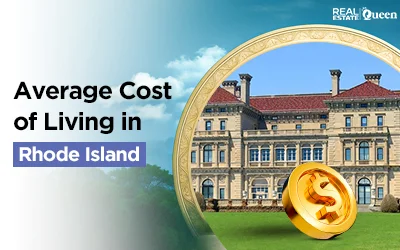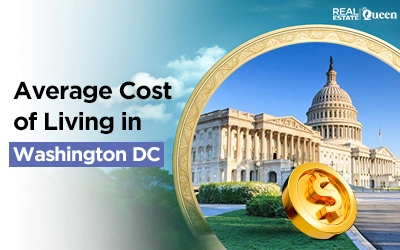
In 2025, Virginia’s housing market presents a unique opportunity for home buyers. Homes sold above the listed price show a drop of 10.73% Y.O.Y., creating a more balanced market.
This guide provides a detailed plan for buying a home in Virginia, navigating its challenges while leveraging its benefits.
Key Takeaways
- Step 1: Figure out your finances and budget.
- Step 2: Get pre-approved for a mortgage.
- Step 3: Find your dream home in Virginia.
- Step 4: Make a competitive offer.
- Step 5 Complete due diligence with inspections.
- Step 6 Secure financing and insurance.
- Step 7 Prepare for and close your purchase.
Current Virginia Housing Market Overview (2025)
The Virginia housing market takes a shift in 2025. Buyers have more leverage with the selling of homes below the price list, with an increase of 22.83% Y.OY. and 6.5% inventory growth. The median home sale price has reached $473,700, with a 1.03% decrease in the average number of homes sold.
How to Buy a Home in Virginia: 7 Steps
Step 1: Figure Out Your Finances
Before searching for homes for sale in Virginia, set a clear budget. The state’s cost of living requires careful financial planning beyond typical home-buying expenses.
Virginia’s effective property tax rate averages 0.80%, notably lower than states like New York but close to California’s 0.81%. Homeowners should also budget for hazard insurance (mandatory) and flood insurance in FEMA zones. These taxes and insurance costs influence affordability alongside mortgage payments.
Get Your Down Payment Ready
In Virginia, FHA loans typically require a minimum credit score of 580, while conventional loans usually need at least 620.
Down payment assistance programs can cover about 3% for conventional loans and 3.5% for FHA loans, with additional support available through Virginia-specific grants and tax credit programs.
Get Pre-Approved for a Mortgage
In 2025, the typical 30-year fixed mortgage rate is around 6.5%. Buyers should prepare documents such as pay stubs, tax returns, bank statements, ID, and credit history to get pre-approved. Pre-approval clarifies your budget and strengthens your offer compared to basic pre-qualification.
Step 2: Find Your Dream Home in Virginia
With a set budget, you can find your dream home faster. Houzeo, Virginia’s best home buying website, allows you to browse through the latest listings with smart filters for price, ZIP code, schools, etc.
Whether you are looking for homes for sale in Virginia Beach, South Boston, or Big Stone Gap, the best place to buy in Virginia depends on your priorities:
- Virginia Beach: Balanced market with moderate price gains. Longer days on market give buyers more time and fewer bidding wars.
- South Boston: one of the most budget-friendly options, with a median value of $133,643 and low taxes of $752.
- Big Stone Gap: highly affordable at a median value of $126,702, paired with property taxes around $860.
Step 3: Make an Offer That Wins
Virginia buyers typically put down earnest money deposits of 1–3% of the purchase price. Offers should include contingencies for financing, inspection, and appraisal to protect you. With median market times as low as 12 days in some regions, act decisively but with proper due diligence.
Step 4: The Crucial Due Diligence Period
In Virginia, buyers typically have 7 to 10 days to complete inspections. A general home inspection, which takes about 2 to 4 hours for single-family homes, is the most common step. Lenders often require a termite inspection, while radon testing is strongly recommended across the state. For rural properties, septic and well inspections are also essential to ensure the home’s systems are safe and functional.
Step 5: Secure Your Financing and Insurance
Finalize your mortgage underwriting, usually taking 30–45 days. Obtain necessary insurance: hazard insurance is required statewide. Flood insurance applies if your property lies in FEMA-designated flood zones. No statewide earthquake insurance mandate exists.
Step 6: Prepare for Closing Day
In Virginia, closing costs usually range from 2% to 4% of the purchase price. Buyers should expect expenses such as lender fees and loan origination, title insurance and settlement charges, property taxes with potential homestead exemptions of up to $5,000 off the assessed value, and prepaid items like homeowner’s insurance and escrow deposits.
Step 7: Welcome Home!
Virginia provides valuable benefits for homeowners. Qualifying residents may receive a Homestead Exemption of up to $5,000 on property taxes. Homeowners can also access local community resources for maintenance and support, along with potential eligibility for first-time buyer savings and tax credit programs.
Tips for Virginia Homebuyers: Do’s and Don’ts
Do’s
- Do get mortgage pre-approval before home shopping.
- Do hire a local Virginia real estate agent with market expertise.
- Do schedule all recommended inspections, including termite and radon.
- Do research local neighborhoods and their market trends.
- Do ask about first-time buyer programs for assistance.
Don’ts
- Don’t skip budgeting for closing and moving costs.
- Don’t waive contingencies just to win a bidding war.
- Don’t ignore local tax exemptions and credits opportunities.
- Don’t rely solely on online listings; visit homes in person.
- Don’t delay securing homeowners insurance—it’s required for closing.
Conclusion
Virginia’s 2025 housing market offers opportunities across a range of price points and regions. Though prices have risen modestly, growing inventory provides more choices. With preparation and local market knowledge, you can confidently navigate your home purchase. Start with strong financial footing, leverage state programs, and work with expert agents to succeed. Your Virginia home awaits.
Frequently Asked Questions
How long does it take to buy a house in Virginia?
It typically takes 41 to 42 days from contract signing to closing, though timing can vary with market factors and financing speed.
➡️Read more to know more about preparation for the closing day
What credit score do I need to buy a house in Virginia in 2025?
The minimum credit score for FHA loans usually requires a minimum credit score of 580, while conventional loans expect 620 or higher.
How can I find my dream home in Virginia?
Find your home in Virginia depending on your priorities, whether it’s Virginia Beach with a balanced market, South Boston with budget-friendly prices, or Big Stone Gap with highly affordable options.





